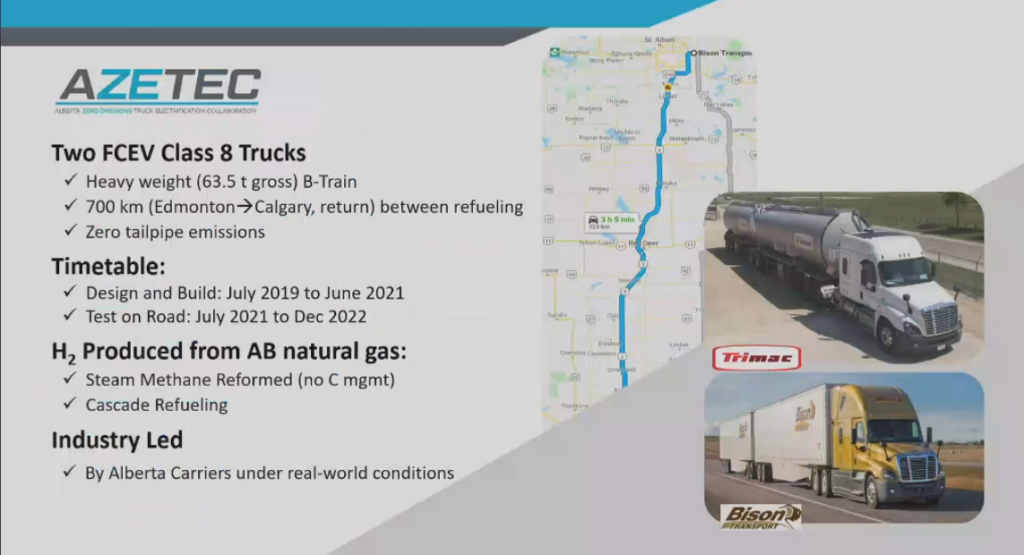Canada looks to trucking to help create a hydrogen economy
MONTREAL, Que. – Canada has an opportunity to develop a hydrogen economy as it strives to meet its goal of carbon neutrality by 2050, but it will need the trucking industry’s help.
And a project is already underway in Alberta to demonstrate the viability of hydrogen as an alternative to diesel in the heavy-duty trucking industry. The Alberta Zero Emissions Truck Electrification Collaboration (AZETEC) project will see two heavy-duty trucks hauling heavy loads at 63,500 kgs (140,000 lbs) between Calgary and Edmonton, Alta. It’s being administered by the Alberta Motor Transport Association.
The trucks require a 700-km range between fueling and will be operated by Bison Transport and Trimac, pulling fully loaded B-trains and twin-53s. Marcel Pouliot, vice-president of industry and regulatory affairs at Trimac, presented details of the project during Movin’ On, a virtual sustainability conference hosted by Michelin June 3.
The first two trucks are in the design stage, and will be deployed by July 2021. They’ll be tested on-highway until December 2022, with the goal of ramping up production of hydrogen electric fuel cell trucks, and the required fueling infrastructure in the years to come.
The hydrogen will be produced using Alberta natural gas through a steam methane reforming process. The cost of the project will be $17 million, with the Alberta government chipping in $7.5 million through its Emissions Reductions Alberta program.
Trucks used were Freightliner Cascadia glider kits, with Ballard Power providing the hydrogen fuel cells and on-board storage systems. Dana is providing the drivetrain and e-propulsion systems, and will assemble the tractors at its recently acquired Nordresa subsidiary in Montreal, Que.

Jessica Lof, research lead, hydrogen economy with the University of Calgary, said there are three objectives to the program: for the Canadian trucking industry to reduce its reliance on internal combustion engines; to provide a credible and compelling solution for the trucking sector to pursue zero-emissions transport; and for trucking to serve as a needed anchor for the development and distribution of hydrogen in Canada.
“We need to look for transformative systems-level change,” she said. “Canada is well positioned to leverage our natural resources to be a producer of hydrogen.”
The steam methane reforming method to initially be used results in an 80-90% reduction in greenhouse gases compared to diesel. It can also be produced using renewable electricity, but at a higher cost. Hydrogen production costs must come in at $3.50-$5 per kilogram to be cost-competitive with diesel at a pre-tax price of 85 cents per liter. Lof said hydrogen can be produced in Alberta for as little as $1/kg.
Electricity costs of less than $30 per megawatt hour (Mwh) make lower-emissions “green” hydrogen production viable, Lof said. To scale up the project to more than 1,000 trucks, fueling stations will need to be built along key transport corridors, with the capability of providing one to three tons of hydrogen per day, Lof noted.
And the trucks themselves will have to be spec’d differently, right down to the tires which will need to manage higher torque outputs, Pouliot added. Even pricing will be impacted, with the traditional fuel surcharge and fuel tax collection methods restructured.
Have your say
This is a moderated forum. Comments will no longer be published unless they are accompanied by a first and last name and a verifiable email address. (Today's Trucking will not publish or share the email address.) Profane language and content deemed to be libelous, racist, or threatening in nature will not be published under any circumstances.
-
Dear Mike,
Fuel cells only supply electricity to drive motor. Any electric drive motor produces lot more torque than conventional technology. We have over 2,000 fuel cell trucks operating in China without any incidence. Thanks
Class 8 fuel cell trucks are successfully operating in California, China, and other locations.
The proposed B-train tractor-trailers in Alberta are marginally larger. The main technical difference is the colder temperatures in Alberta, vs. CA or CN.
Note, making hydrogen from AB oil sands, with carbon capture and storage, will make Blue Hydrogen, with a low carbon footprint.
Best,
–Keith
@KeithDPatch
You’re absolutely right, James! Even the most hard-core environmentalists understand: without “Green Hydrogen,” we will never achieve the proverbial Net Zero Energy in Transportation or Buildings. And using massive utility-scale wind/PV generators in addition to the stacks of electrolyzers is TOO EXPENSIVE!
Welcome to the era of in situ “Green Hydrogen” produced at 1/10 of the cost of renewable energy – right at our oil sands! It’s Canadian ingenuity and hard-knocks entrepreneurship that makes such innovation possible!
Countries like Australia are aiming to become the world’s largest providers of “Green Hydrogen”. But to do so, Australia must cover its vast lands w/ wind turbines and PV panels – as renewable energy “Green Hydrogen” is very expensive to produce.
Our oil sands can generate even a much greater amount of “Green Hydrogen” than Australia. And we can do it right here, right now – not in 5 years. And we can do so without great expenses!
Yes, for the next 30 years, Alberta can supply both: all the “Green Hydrogen” AND all the oil that Canada will need! You can find more details in my LinkedIn post: Greening the Oil Sands – Canada’s Greatest Opportunity of the Century!
I’m a full truck drive and I’m ready to work in all conditions
Higher torque is generated by the hydrogen fuel cell, the article says. So high, that even special tires are needed. Watch those trucks jack-knife and slide off the roads in winter, is all that I can say! Stupid idea to start with. Why not go with liquid natural gas engines instead?